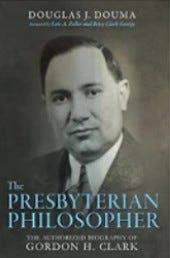The Presbyterian Philosopher:
The Authorized Biography of Gordon H. Clark
Douglas J. Douma (Oregon: Wipf & Stock, 2017)
When the phrase “presuppositional apologetics” is used by most Christians, what is referred to is the method of apologetics taught by Cornelius Van Til, later popularized by his protege Greg Bahnsen. However, presuppositionalism is not limited to Van Til’s particular articulation of it. Indeed, at the time when Van Til’s apologetic was becoming widely known there was another presuppositionalist who was presenting a different version of the method. That man was Gordon H. Clark, the Presbyterian philosopher.
Despite historical events leading to Van Til’s methodology becoming virtually synonymous with “presuppositionalism,” Clark’s apologetical contributions are widely recognized by many Reformed thinkers, as are his contributions to theology more broadly considered and his contributions to Christian philosophy. These contributions are: “(1)an axiomatized epistemological system, (2)teleological supralapsarianism, (3)a solution to the problem of evil, and (4)arguments for a traditional return to logic.” Chapter 10 of this work accurately, clearly, and succinctly summarizes these ideas, presenting Scripturalism in an accessible reading style to readers who may or may not be familiar with the intricacies of epistemology, metaphysics, and logic.
Douma’s biography reveals that Clark’s contributions to the body of Christ were not limited to the intellectual and abstruse, but also consisted of preaching, evangelizing, pastoring, parenting, and mentoring young men. Clark’s philosophic and personal ministries were balanced, neither one outweighing the other, and Douma’s book relays this in an equally balanced manner. Given the controversial nature of some of Clark’s engagements with well known Reformed thinkers, among whom one finds Van Til featuring prominently, a balanced biography written by one who is favorable toward the presuppositionalism of Gordon H. Clark seems unlikely. Yet Douma manages to give a just and fair assessment of Clark and his opponents over the years.
An important lesson one learns from The Presbyterian Philosopher, albeit indirectly, is that the church would do well to listen to warnings given by her godly leaders. More than once in his lifetime, Clark foresaw ecclesiastical and institutional problems. Had his peers listened to his warnings, denominational splits and even the current hodge-podge mixture of orthodoxy, heterodoxy, and heresy within “evangelicalism” could have been at least postponed, if not entirely avoided. Clark was not a prophet, nor was he sinless, but he was a wise man whose advice, sadly, was fought against to the detriment of those in his Presbyterian camp, as well as the “Fundamentalists,” and Evangelicalism.
The Presbyterian Philosopher is a wonderful read that has value for our contemporary age, where godly men are sometimes pushed to the sidelines, or outright ridiculed and slandered for daring to be discerning. It is an encouragement to the church, an historical record of how God prepares, sends forth, and works through his ministers of the Gospel, though they are flawed sinners facing opposition from other flawed sinners. Finally, Clark’s biography is an encouragement to Christian apologists and philosophers to press on in the defense of the faith, and to do so with logical precision, theological fidelity, and love for God and one’s neighbor.
—h.





